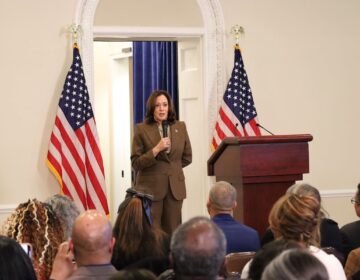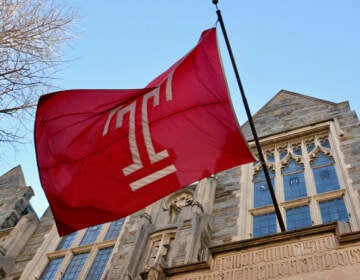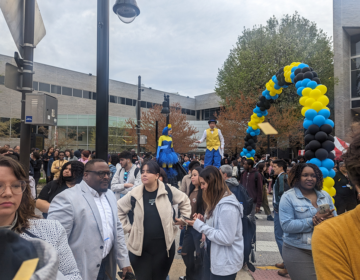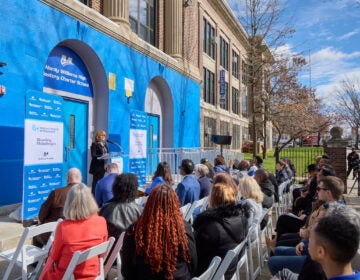Frederick Douglass’ descendant delivers free memoirs to Philly students
Against the backdrop of recent book bans, Kevin Douglass Greene's efforts have been highlighted as a way to help preserve American history.
Listen 1:33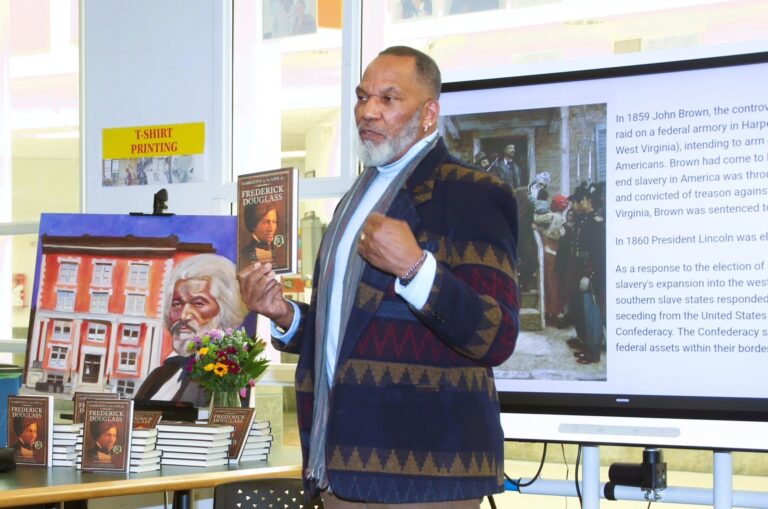
Kevin Douglass Greene, great-great grandson of abolitionist, author and social reformer Frederick Douglass, speaking at School of the Future on Thursday, Feb. 15. (Patriciah Hawkins)
From Philly and the Pa. suburbs to South Jersey and Delaware, what would you like WHYY News to cover? Let us know!
It’s been more than 200 years since Frederick Douglass was born into slavery, but his impact on our country and here in Philadelphia has not been forgotten.
Douglass, an author, orator and abolitionist, is considered one of the most iconic anti-slavery leaders of the 19th century.
His 1845 memoir, “Narrative of the Life of Frederick Douglass, an American Slave,” which described his experiences as an enslaved person, became a bestseller.
Now, that book has found its way into the hands of students in one Philly classroom centuries later, thanks to his descendants and local organizations.
Frederick Douglass’ great-great grandson Kevin Greene traveled to Philly on February 15, the day after what would’ve been Douglass’ 206th birthday, to deliver dozens of books to local students and speak at their Black History Month celebration.
Greene and his cousin Kenneth B. Morris Jr., founder of The Frederick Douglass Family Initiative, hope to provide 1 million of Douglass’ books to students across the country.
FDFI introduced the One Million Abolitionists project by publishing a special bicentennial edition of the memoir.
So far, 600 copies of Douglass’ book have been distributed to students across Philadelphia since they partnered with the nonprofit Hands Across Philadelphia and its founder, North Philly native Nicole Ross.
Green and Ross delivered 40 copies of the book to an excited group of students in the African American Advanced Placement classes at the School of the Future.
Greene says their program is about bridging the gap between generations and providing students with as many books as possible.
“It’s called the One Million Abolitionist project, so the books are designed for young people. Young people do not have to pay for books. The idea is to get the books into their hands. One is for them to learn and understand the Frederick Douglass story and have their own piece of the Frederick Douglass story by having their own books,” said Greene.
Meagan Rubino, who has been a teacher for 18 years, teaches AP U.S. History and U.S. History to 10th and 11th-grade learners. She says it was not only crucial for her class to receive the book but also an invaluable opportunity to meet the man who was a descendant of the legendary activist.
“It’s so important for the kids to have these kinds of experiences where we’re making history from the past real and relevant to today,” Rubino said.
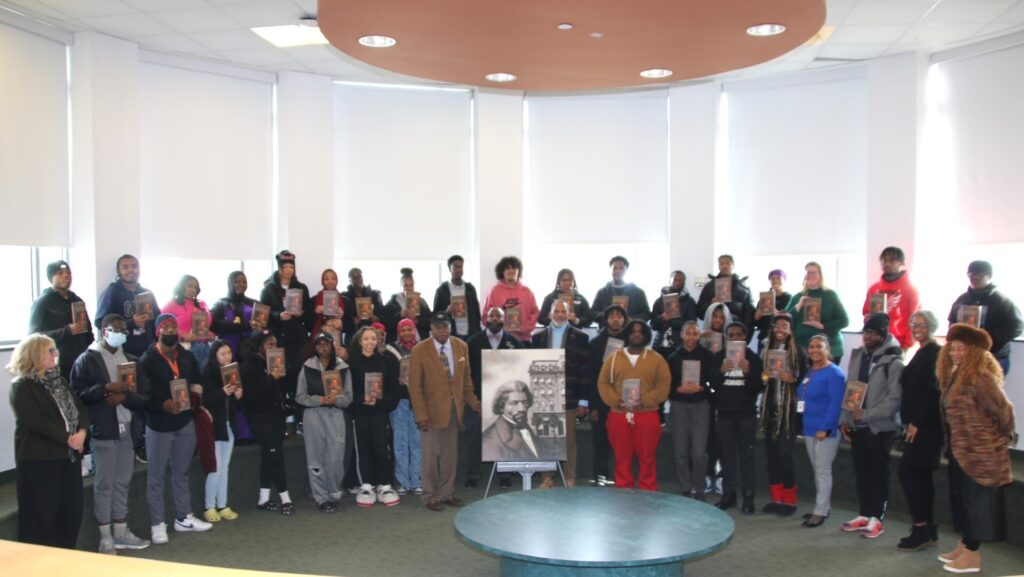
Neferteri Strickland helped coordinate the book’s distribution and works with the region on history-fused STEM events that bring real-life speakers and resources to students.
“If we’re willing to have these conversations to innovate the way that we learn and teach history, we can create some meaningful learning experiences,” Strickland said.
Both Strickland and Rubino expressed the importance of keeping history alive through these lessons and said the access the district gives to ensure its students can freely learn about Black history is particularly relevant today.
“I think a lot of the time kids think I’m just going to be a cog in the machine. [They think] I’m just going to be living a basic human existence. But when they can see that people that we read about in history have legacies and that they are possibly going to be able to have a legacy like, what are they passing down? What are the things that they will pass down if they have children? Those things are just as important as the people that we read about because their lives can be just as important, and their ordinary lives can be just as extraordinary,” said Rubino.
Eleventh-grader Saafiya Gresham was one of those students inspired by Greene and other speakers and said she appreciates the real-life lessons they demonstrated to her and her peers.
“I am appreciative of the effort the speakers made in coming to talk to us and educate us,” Gresham said.
Gresham received a book signed by Greene and a chance to hear first-hand about his life as a descendant of Douglass. She says it’s an experience that she will never forget, “I appreciate the interest in helping to educate the kids of this school because public school systems need to educate children more on Black Power and the legacy of African American achievements,” said Gresham.
Black History Month and book bans
The White House has used Black History Month as an opportunity to speak out against the recent bans on books featuring mentions of race and the ban on critical race theory. These bans are impacting students across the country.
In Florida, more than 100 books have been banned by the governor due to references to race and sexual orientation. The history of slavery has been rewritten to exclude the cruel, racist, and oppressive impact on Black people. Students are being told that enslaved people earned valuable trades they could use in life and as a career.
White House Press Secretary Karine Jean-Pierre told WHYY News the White House believes Black history should be celebrated and remembered.
“We like to say yes, this is a month where we lift up and honor Black Americans, especially the ones who came before us,” said Jean-Pierre.
The White House partnered with Morris and his initiative to honor Douglass and other civil rights activists during a special Descendants Day celebration on Feb. 13.
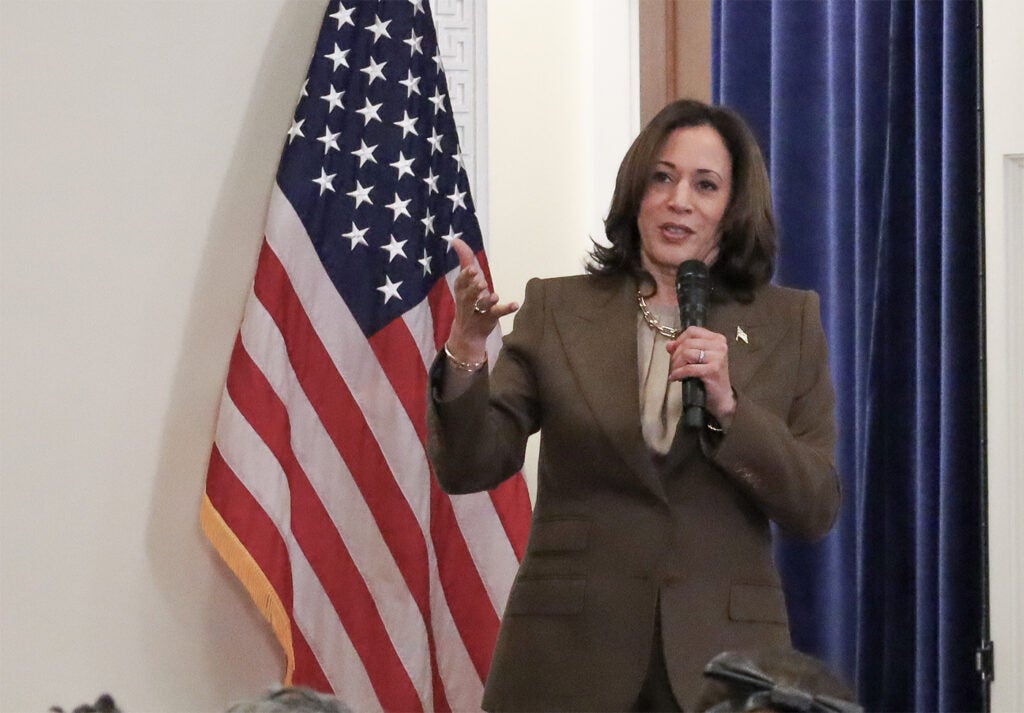
Vice President Kamala Harris stressed how important it is not to erase history. “Let’s keep this history alive, especially in the face of those who would attempt to edit it out or re-write it according to their view of what the world is or should be. Let’s continue to celebrate our heroes,” said Harris.
In a conversation on the White House grounds after the event, Morris Jr. told WHYY News they hope to educate more students about the past to make for a better future.
“I believe that our young people don’t know where they come from, but it’s not their fault. We have an obligation to make sure that we are teaching this history,” said Morris Jr.
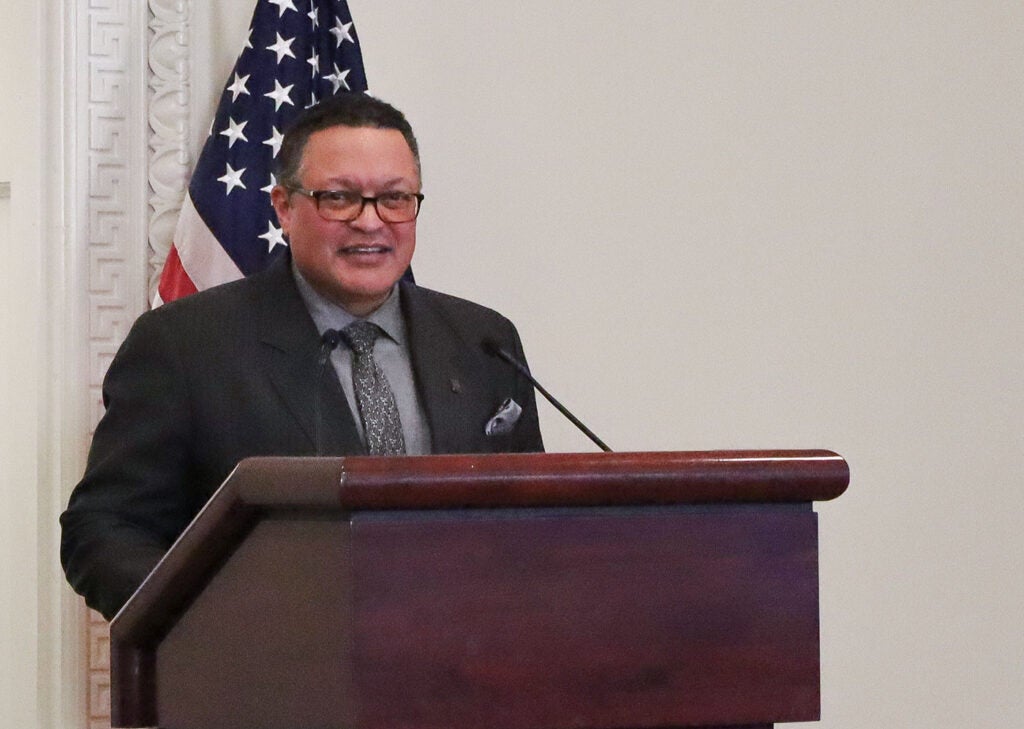
“What we like to teach young people is that…those of us that had ancestors that were enslaved, they endured, they survived, and the reason we are here today is because of their resilience.”
The School District of Philadelphia was one of the first districts in a major U.S. city to require African American History as a graduation requirement for all high school students in 2005. Last year, the district also launched a series of lessons and professional learning opportunities for internal and external educators to build their knowledge around topics traditionally excluded in instructional resources, including an Africana Studies Lecture Series.
Ross says she is glad to live in a city that highlights and appreciates Black history but has also dedicated her time and resources to help teachers from across the country who do not have the same support.
“It was wonderful to hear the resilience of our teachers and how important Black History is to them across the country. I’m very encouraged … Teachers across the country are finding ways to adapt to these rules, and it’s creating an opportunity because of the obstacles to give teachers more incentive to really be engaged,” said Ross.
Greene says he will partner with Ross to distribute more books across the city of brotherly love but hopes also to spread the message and donate books to more students across the commonwealth. Morris Jr. and Greene hope to reach their goal to put 1 million books in the hands of students across the country.

Get daily updates from WHYY News!
WHYY is your source for fact-based, in-depth journalism and information. As a nonprofit organization, we rely on financial support from readers like you. Please give today.



